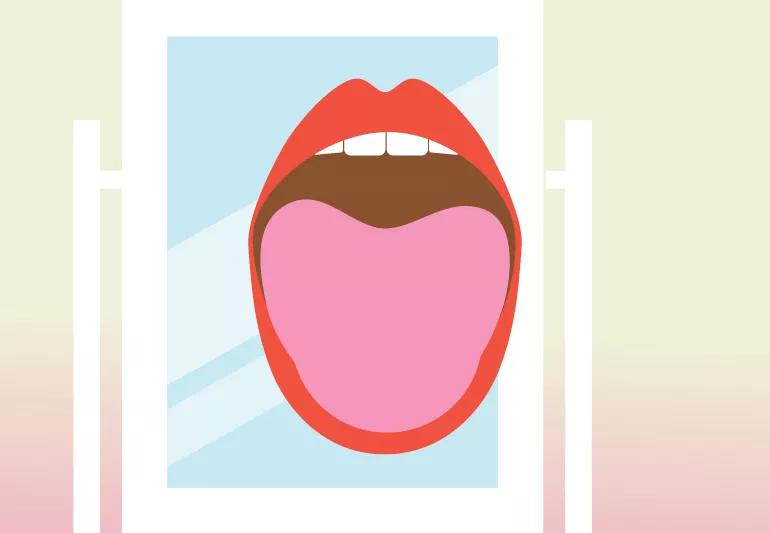Reasons why you should ‘watch’ your tongue

Image content: This image is available to view online.
View image online (https://assets.clevelandclinic.org/transform/e20e3840-c79b-41e3-a902-c0be606fcb06/healthy-tongue-537971479_jpg)
Healthy Tongue
For clues about problems in your mouth, stick out your tongue and look in the mirror. A healthy tongue should be pink and covered with small nodules (papillae). Any deviation from your tongue’s normal appearance, or any pain, may be cause for concern.
Advertisement
Cleveland Clinic is a non-profit academic medical center. Advertising on our site helps support our mission. We do not endorse non-Cleveland Clinic products or services. Policy
Family physician Daniel Allan, MD, discusses why you should watch for changes that might need to be evaluated by a doctor or dentist.
A white tongue, or white spots on your tongue, could be an indication of:
Oral thrush – a yeast infection that develops inside the mouth. It appears as white patches that are often the consistency of cottage cheese. “Oral thrush is most commonly seen in infants and the elderly, especially denture wearers, or in people with weakened immune systems,” says Dr. Allan. “People with diabetes and those who are taking inhaled steroids for asthma or lung disease can also get it. And oral steroids can trigger thrush too. Oral thrush is also more likely to occur after you’ve taken antibiotics.”
Leukoplakia – a condition in which the cells in the mouth grow excessively, which leads to white patches on the tongue and inside the mouth. “Leukoplakia can develop when the tongue has been irritated,” Dr. Allan says. “It’s often seen in people who use tobacco products. Leukoplakia can be a precursor to cancer, but isn’t inherently dangerous by itself. If you see what you think could be leukoplakia, contact your dentist for an evaluation.”
Oral lichen planus – a network of raised white lines on your tongue that look similar to lace. “We don’t always know what causes this condition, but it usually resolves on its own,” says Dr. Allan.
Advertisement
A red tongue could be a sign of:
Vitamin deficiency – “Folic acid and vitamin B-12 deficiencies may cause your tongue to take on a reddish appearance,” Dr. Allan says. A simple blood test is available to determine these levels.
Geographic tongue – This condition causes a map-like pattern of reddish spots to develop on the surface of your tongue. “These patches can have a white border around them, and their location on your tongue may shift over time,” says Dr. Allan. “Geographic tongue is usually harmless.”
Scarlet fever – an infection that causes the tongue to have a strawberry-like (red and bumpy) appearance. “If you have a high fever and a red tongue, you need to see your family doctor,” Dr. Allan says. “Antibiotics are necessary to treat scarlet fever.”
Kawasaki disease –a condition that can also cause the tongue to have a strawberry-like appearance. It is seen in children under the age of 5 and is accompanied by a high fever. “Kawasaki disease is a serious condition that demands immediate medical evaluation,” says Dr. Allan.
Much like hair, the papillae on your tongue grow throughout your lifetime. In some people, they become excessively long, which makes them more likely to harbor bacteria.
“When these bacteria grow, they may look dark or black, and the overgrown papillae can appear hair-like,” Dr. Allan says. “Fortunately, this condition is not common and is typically not serious. It’s most likely to occur in people who don’t practice good dental hygiene.”
He says people with diabetes, taking antibiotics or receiving chemotherapy may also develop a black hairy tongue.
Painful bumps on your tongue can be due to:
Trauma – “Accidentally biting your tongue or scalding it on something straight out of the oven can result in a sore tongue until the damage heals,” says Dr. Allan. “Grinding or clenching your teeth can also irritate the sides of your tongue and cause it to become painful.”
Smoking – Smoking irritates your tongue, which can cause soreness.
Canker sores – mouth ulcers. “Many people develop canker sores on the tongue at one time or another,” Dr. Allan says. “The cause is unknown, but stress is believed to be a factor.” Canker sores normally heal without treatment within a week or two.
Oral cancer – “A lump or sore on your tongue that doesn’t go away within two weeks could be an indication of oral cancer,” says Dr. Allan “Keep in mind that many oral cancers don’t hurt in the early stages, so don’t assume a lack of pain means nothing is wrong.”
Advertisement
Dr. Allan says everyone should check their tongue on a daily basis when they brush their teeth and tongue. “Any discoloration, lumps, sores or pain should be monitored and evaluated by a medical professional if they don’t go away within two weeks,” he says.
Advertisement

Sign up for our Health Essentials emails for expert guidance on nutrition, fitness, sleep, skin care and more.
Learn more about our editorial process.
Advertisement
Say ahhh and add this step to your toothbrushing routine
Most parents report an improvement in breastfeeding, but there’s a chance the procedure won’t solve the issue
Bleeding is a risk and warrants taking care, but the reward of this lifesaving medication is great
Severe and debilitating headaches can affect the quality of your child’s life
With repeat injections over time, you may be able to slow the development of new wrinkles
Type 2 diabetes isn’t inevitable with these dietary changes
Applying a hot or cold compress can help with pain
Pump up your iron intake with foods like tuna, tofu and turkey